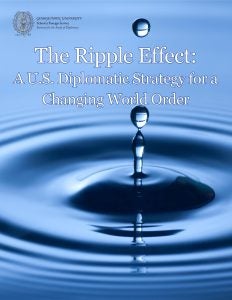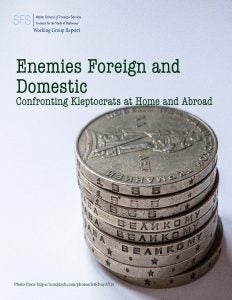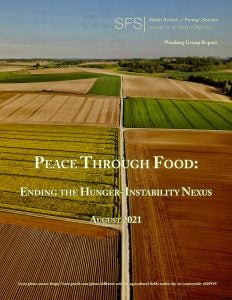New Global Commons Working Group
With the generous support from the Carnegie Corporation of New York’s “Bridging the Gap” initiative, ISD launched a working group in October 2016 entitled “The New Global Commons: Emerging Global Diplomatic Challenges.”
Bringing together senior practitioners, policymakers, and leading academics, the series harnesses the experience and collective knowledge of this broad range of experts to discuss and find workable policy solutions and guiding principles to some of the world’s most pressing issues through the end of the decade and beyond.
The Ripple Effect: A U.S. Diplomatic Strategy for a Changing World Order
Russia’s February 2022 invasion of Ukraine upended what policymakers thought they knew about the world and territorial military aggression. The ensuing war has brought destruction to Europe unlike anything since the Second World War. Regardless of how the war ends, several strategic trends, whether entirely new or preexisting and now reinforced, have set in a motion a new strategic environment in which the United States must compete. Ultimately, the new strategic environment is being defined by a global diffusion of power, where the agency of middle powers and their importance in solving geopolitical problems rise in tandem.
In the spring of 2023, ISD convened two New Global Commons/Schlesinger Strategic Surprise working group meetings with participants drawn from academia, think tanks, government, international organizations, non-governmental organizations, and the private sector. The group identified key trends and potential strategic surprises emanating from Russia’s invasion of Ukraine, honed in on the issues that would affect the strategic environment regardless of the war’s outcome, and put forth policy guidelines and recommendations for the United States as it seeks to navigate a more diverse geopolitical landscape in the coming years.
- Click here to read the report
- Click here to watch ISD and USIP’s discussion on how American diplomacy can effectively engage an evolving multilateral system.
Enemies Foreign and Domestic: Confronting Kleptocrats at Home and Abroad
As Putin and his kleptocratic regime of oligarchs wage a devastating war in Ukraine, the costs of corruption have never been so starkly visible. Beyond Russia, recent examples of corruption in China, Afghanistan, the Northern Triangle, the Solomon Islands, and elsewhere, prove that rampant corruption poses a significant threat to aspirations for a greener, healthier, more peaceful, and more democratic world. Countries such as Russia and China have elevated their brand of corruption into a distinct and powerful aspect of their foreign policy. They employ this strategic corruption abroad to stunt economic growth; prop-up fellow authoritarian regimes; exacerbate social inequality; erase political trust; accelerate pandemics and degrade healthcare systems; exploit the environment; and propel state oppression. As U.S. policymakers seek to counter this strategic corruption, they must first recognize the extent to which domestic laws and actors within the United States enable this corruption to fester.
In the fall of 2021 and spring of 2022, ISD convened a series of New Global Commons working group meetings with participants drawn from academia, think tanks, government, international organizations, non-governmental organizations, and the private sector. The group crafted workable definitions of corruption, evaluated the unique political and related threats posed by corruption and kleptocracy, assessed Russia and China’s use of strategic corruption, and developed principles and recommendations for government and non-government entities to build a global, sustained, anti-corruption response.
Peace Through Food: Ending the Hunger-Instability Nexus
In the twentieth century, humankind made phenomenal steps to increase food production. But today, complex and interrelated issues drive an increase in food insecurity globally, and propel conflict, migration, and human insecurity. Nearly a billion people, at a minimum, are malnourished or suffer the pains of hunger—while the world wastes a third of food produced. This pain, or the fear of it, drives political instability and conflict as people seek reliable access to food. Adverse climate events, poor resource management, disease outbreaks, breakdowns in distribution, and profit-driven research and development, among other factors, have led to structural imbalances and inequities in the food system, which limit consistent access to nutrition for an increasing number of people.
In spring 2021, the Institute for the Study of Diplomacy convened a series of working group meetings with participants representing academia, think tanks, government, international organizations, NGOs, and the private sector. The group mapped out the current state of global food systems, discussed the relationship between hunger and conflict, and sought ways to establish food security as a means to promote stability and end conflict.
The New Weapon of Choice: Technology and Information Operations Today
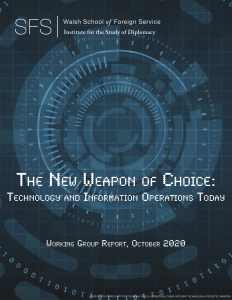 In recent years, a growing number of governments, non-state actors, and citizens have rapidly expanded their use of pernicious information operations against other countries and even their fellow citizens. Social media and the internet have become the main tool. The current technological revolution has lowered the cost of entry for those wishing to spread misinformation and disinformation. Some use the internet to propagate an alternative version of the global order they seek to dominate, to damage a regional rival, or to influence their own or others’ elections. The players, tactics, tools, and topics will continue to expand in the months and years ahead, and the coronavirus pandemic has only enhanced the salience of these activities.
In recent years, a growing number of governments, non-state actors, and citizens have rapidly expanded their use of pernicious information operations against other countries and even their fellow citizens. Social media and the internet have become the main tool. The current technological revolution has lowered the cost of entry for those wishing to spread misinformation and disinformation. Some use the internet to propagate an alternative version of the global order they seek to dominate, to damage a regional rival, or to influence their own or others’ elections. The players, tactics, tools, and topics will continue to expand in the months and years ahead, and the coronavirus pandemic has only enhanced the salience of these activities.
Information operation campaigns sow confusion, further divide deeply partisan societies, and are an existential threat to democracies around the world. Thus far, governmental, tech sector, and civil society responses have fallen short, although some have fared better than others. In fall 2019 and the spring 2020, the Institute for the Study of Diplomacy convened a series of working group meetings that included academics and practitioners, private sector specialists, and representatives from civil society. The attendees mapped out this space and identified the challenges inherent in this new form of incipient and widespread information operations. This group also identified potential areas of further engagement, collaboration, and research within the private sector, academia, and civil society. Ultimately, the group came up with a set of principles and policy recommendations for governments, private sector companies, and civil society to enact in both the near-and-long-term in order to mitigate information operations.
Since completion of this working group, ISD has partnered with the Partnership for Countering Influence Operations (PCIO) at the Carnegie Endowment for International Peace in order to help foster a multidisciplinary international community working to understand influence operations — a key recommendation of our report. Each month, we convene a brainstorming session with PCIO members and partners called “The Sphere of Influence.”
The Rise of Metropolitanism: The International Order and Sub-National Actors
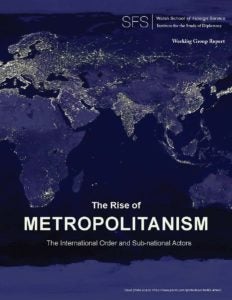 The growth and international clout of cities and sub-state actors has been unparalleled in recent decades. These players seek agency in the international arena, forming networks at the sub-state level that help shape new organizing principles for international cooperation on Global Commons issues like climate, health, transnational crime, and migration. These types of issues will continue to create opportunities for sub-national leadership to help shape outcomes beneficial for all—not just cities and states—through systematic interactions, a stronger connection up and down between cities, states, national capitals, and international bodies, and a larger voice for sub-national actors on Global Commons issues.
The growth and international clout of cities and sub-state actors has been unparalleled in recent decades. These players seek agency in the international arena, forming networks at the sub-state level that help shape new organizing principles for international cooperation on Global Commons issues like climate, health, transnational crime, and migration. These types of issues will continue to create opportunities for sub-national leadership to help shape outcomes beneficial for all—not just cities and states—through systematic interactions, a stronger connection up and down between cities, states, national capitals, and international bodies, and a larger voice for sub-national actors on Global Commons issues.
To explore sub-national activism and its effects upon the international arena, in late 2018 the Institute for the Study of Diplomacy convened a working group on “The New Metropolitanism.” Participants included experts and practitioners drawn from the ranks of local governance, academia, think tanks and research institutions, as well as the diplomatic community. They discussed whether the continuation and pace of this phenomenon is inevitable or a passing response to stalled nation-state leadership; and how this rising “metropolitanism” complicates—or complements—the work of central governments and “old-world” international relations.
This report provides a set of policy guidelines and recommendations, aimed at multiple audiences: cities and other sub-national actors and those that work with and within them; national governments; nation-state level foreign ministries; and international organizations. The ultimate goal is to ensure that all the relevant players find ways to harness emerging sub-national activism towards processes, procedures, and relationships that can produce innovative solutions to global challenges.
The New Arctic: Navigating the Realities, Possibilities, and Problems
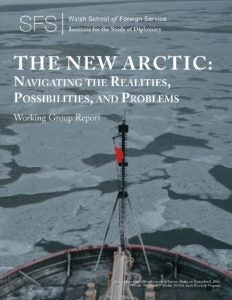 A July 2018 ISD report on “The New Arctic: Navigating the Realities, Possibilities, and Problems” explores the implications of the New Arctic, and the broader geopolitical repercussions of these changes. The Arctic region has become a New Global Common. Increasingly navigable seaways and new access to natural resources create both opportunities for greater collaboration between Arctic and non-Arctic nations, as well as potential flashpoints, environmental disasters, and threats to indigenous communities. The challenge is to mitigate all of these potential threats, and develop the policies, partnerships, and infrastructure to help guide Arctic diplomacy in the decades to come.
A July 2018 ISD report on “The New Arctic: Navigating the Realities, Possibilities, and Problems” explores the implications of the New Arctic, and the broader geopolitical repercussions of these changes. The Arctic region has become a New Global Common. Increasingly navigable seaways and new access to natural resources create both opportunities for greater collaboration between Arctic and non-Arctic nations, as well as potential flashpoints, environmental disasters, and threats to indigenous communities. The challenge is to mitigate all of these potential threats, and develop the policies, partnerships, and infrastructure to help guide Arctic diplomacy in the decades to come.
Religious Intolerance and America’s Image and Policies Abroad
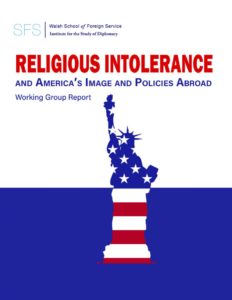 The Oct. 27, 2018 attack on worshipers in Pittsburgh’s Tree of Life synagogue was a stark reminder that hate crimes and religious persecution threaten not just individuals and communities, but undermine fundamental human freedoms. A new ISD report on “Religious Intolerance and America’s Image and Policies Abroad” examines the rise in domestic hate crimes against Jews, Muslims, and other faith communities in America – and how the impact of domestic religious intolerance and bigotry extends far beyond the U.S. border. The report, based on a March 2018 working group and public forum with experts from the diplomatic corps, academia, nongovernment organizations, and U.S.-based faith communities, explores these dynamics and ways in which governments and civil society can mitigate the dangerous consequences.
The Oct. 27, 2018 attack on worshipers in Pittsburgh’s Tree of Life synagogue was a stark reminder that hate crimes and religious persecution threaten not just individuals and communities, but undermine fundamental human freedoms. A new ISD report on “Religious Intolerance and America’s Image and Policies Abroad” examines the rise in domestic hate crimes against Jews, Muslims, and other faith communities in America – and how the impact of domestic religious intolerance and bigotry extends far beyond the U.S. border. The report, based on a March 2018 working group and public forum with experts from the diplomatic corps, academia, nongovernment organizations, and U.S.-based faith communities, explores these dynamics and ways in which governments and civil society can mitigate the dangerous consequences.
New Challenges to Human Security: Environmental Change and Human Mobility
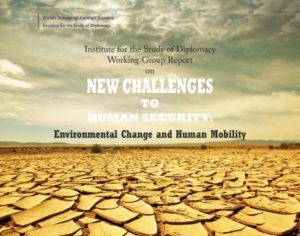 From bustling megacities to remote Pacific islands, climate change has profound implications for how people live and work — and whether conflicts over water, land, and other resources become local or global security challenges. To analyze how environmental shifts shape both internal and external patterns of migration, the Institute for the Study of Diplomacy’s New Global Commons working group met in late 2016 to explore the nexus between climate change and human security.
From bustling megacities to remote Pacific islands, climate change has profound implications for how people live and work — and whether conflicts over water, land, and other resources become local or global security challenges. To analyze how environmental shifts shape both internal and external patterns of migration, the Institute for the Study of Diplomacy’s New Global Commons working group met in late 2016 to explore the nexus between climate change and human security.
The working group’s report, “New Challenges to Human Security: Environmental Change and Human Mobility,” summarizes these discussions and provides a set of guiding principles for policymakers, non-governmental organizations, and international institutions. More than wacky weather and swamped islands, climate change has the potential to put millions of people on the move worldwide. This report looks at what experts in human mobility, climate change, and resource management understand about the environmental drivers of migration, as well as what local and national governments are already doing to mitigate the impact of climate change on communities, as well as prepare for planned migration events.
